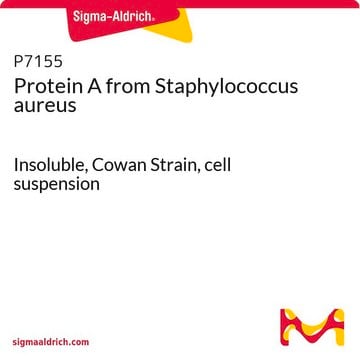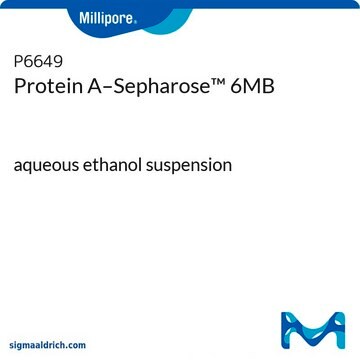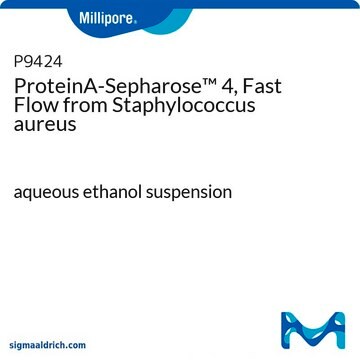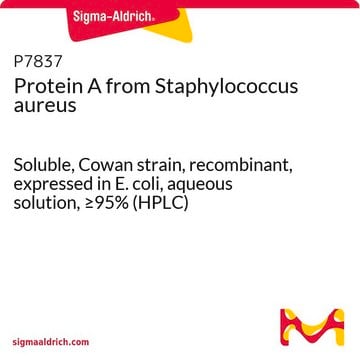P5906
Protein A (extracellular)–Agarose from Staphylococcus aureus
lyophilized powder
Sign Into View Organizational & Contract Pricing
All Photos(1)
About This Item
Recommended Products
biological source
Staphylococcus aureus
Quality Level
form
lyophilized powder
extent of labeling
~2 mg per mL
matrix
Cross-linked 4% beaded agarose
matrix activation
cyanogen bromide
matrix attachment
amino
matrix spacer
1 atom
capacity
≥20 mg/mL (Human IgG)
storage temp.
2-8°C
Looking for similar products? Visit Product Comparison Guide
Application
Protein A-agarose is used for affinity chromatography, antibody purification and characterization, and protein A, G and L resins. Protein A-agarose has been used to study the effects of protein A immunoadsorption in patients with chronic dilated cardiomyopathy as well as to study multiple sclerosis and gastric cancer.
Quantity
Swelling: 1 g swells to approx. 4 ml.
Physical form
Lyophilized powder stabilized with lactose
Storage Class Code
11 - Combustible Solids
WGK
WGK 3
Flash Point(F)
Not applicable
Flash Point(C)
Not applicable
Personal Protective Equipment
dust mask type N95 (US), Eyeshields, Gloves
Choose from one of the most recent versions:
Already Own This Product?
Find documentation for the products that you have recently purchased in the Document Library.
D Mahadevan et al.
Oncogene, 26(27), 3909-3919 (2007-02-28)
KIT or alpha-platelet-derived growth factor receptor (alpha-PDGFR) activating mutations are the pathogenic mechanisms that characterize gastrointestinal stromal tumors (GIST). Despite excellent responses to imatinib mesylate (IM), patients are relapsing. We developed an IM-resistant GIST cell line (GIST-R) from the IM-sensitive
I Politis et al.
Journal of dairy science, 78(3), 484-490 (1995-03-01)
The effect was examined of individual caseins on the rate of plasminogen activation by bovine urokinase-type and tissue-type plasminogen activators. All individual caseins (alpha-CN, beta-CN, and kappa-CN) enhanced the activity of both types of plasminogen activators. Optimal concentrations for alpha-CN
Tao Wang et al.
iScience, 25(1), 103676-103676 (2022-01-18)
The Wiskott-Aldrich syndrome protein and SCAR homolog (WASH), an actin nucleation-promoting factor, is present in the nucleus where it regulates gene transcription and maintains nuclear organization. Here, we show that WASH interacts with core non-homologous end-joining (NHEJ) factors including Ku70/Ku80
Gina-Marie Barletta et al.
The Journal of biological chemistry, 278(21), 19266-19271 (2003-03-21)
Glomerular visceral epithelial cells (podocytes) appear to play a central role in maintaining the selective filtration barrier of the renal glomerulus. While the immunoglobulin superfamily member Nephrin was proposed to act as a cell adhesion molecule at the podocyte intercellular
K Klaamas et al.
Neoplasma, 55(2), 143-150 (2008-02-02)
All human immunoglobulins are glycosylated. The changes in IgG glycosylation are associated with autoimmune disorders and pregnancy. Little is known about IgG glycosylation in patients with cancer. A lectin enzyme-linked immunosorbent assay (LELISA) based method was developed for measuring the
Our team of scientists has experience in all areas of research including Life Science, Material Science, Chemical Synthesis, Chromatography, Analytical and many others.
Contact Technical Service







